
Posted by
Mordy Oberstein
What are Google entities and how does Google understand them?
Knowing how Google understands entities is extremely important when it comes to entity optimization. Especially since Google now profiles sites (i.e., treats them as entities). In the recent past, I showed how Google has a hard time understanding an entity’s secondary profile. However, as I mentioned there, that’s not the full story to Google’s entity understanding narrative.
While Google has some hangups when it comes to understanding entities, it’s also made some giant leaps.
In this post, I’ll show you what the Topic Layer is, how Google is using it to reach deeper than ever into entities, and why it might be on the verge of taking things to a whole new level!
What’s more, understanding how Google understands entities can really help you in creating an effective semantic SEO strategy.

But first, for those of you who don’t know what a Google entity is…
Semantic Search and the Topic Layer
From the Hummingbird days, Google became a semantic search engine. This means Google attempts to understand the search intent of a query by determining the contextual meaning of the words in the query.
Google is then able to match the query to content that answers the query.
In order to do this, Google has to understand entities (such as places and people). Google keeps all of this entity information in a database called the Knowledge Graph. In 2018, Google added the Topic Layer to its Knowledge Graph.
Okay, so what is the Topic Layer?
The Topic Layer is Google’s attempt to organize the information in the Knowledge Graph into topics and sub-topics. By doing this, Google has dramatically changed Google search as we know it.
Now that I’ve gotten that out of the way, let’s get on with my Google entity analysis.
Google Entity Analysis – The Topic Layer
One of the recent developments that I’ve noticed is an increase in Google’s use of its Topic Layer. The Topic Layer refers to Google’s ability to show topics that are entity-specific on the SERP. This traditionally manifests itself via tabs within the mobile Knowledge Panel. For example, a Knowledge Panel for a long-haired species may include a tab for “Grooming” while a short-haired species quite logically has no such tab.
It appears that Google’s tendency to add more uniquely relevant topical content to the Knowledge Panel has increased. Here’s a Knowledge Panel for Disney as it appeared on July 3rd, 2019:
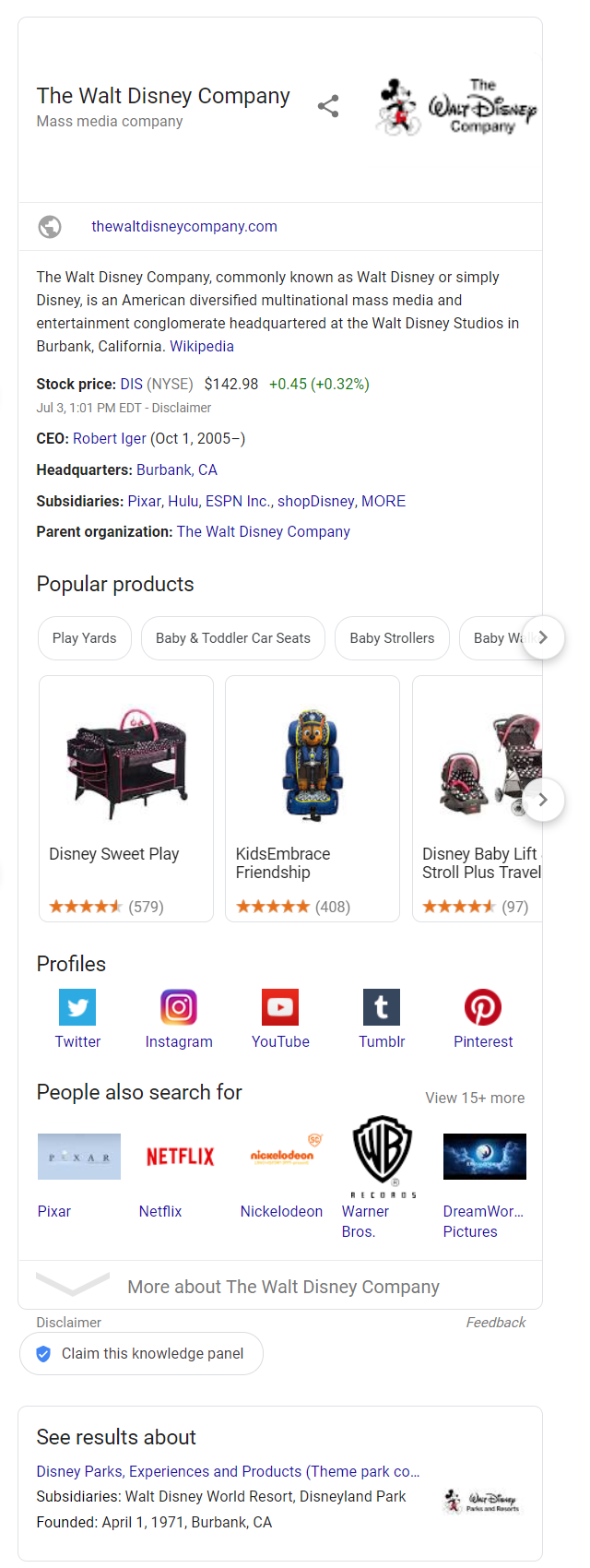
Here’s the very same Knowledge Panel less than a week later on July 8th, 2019:
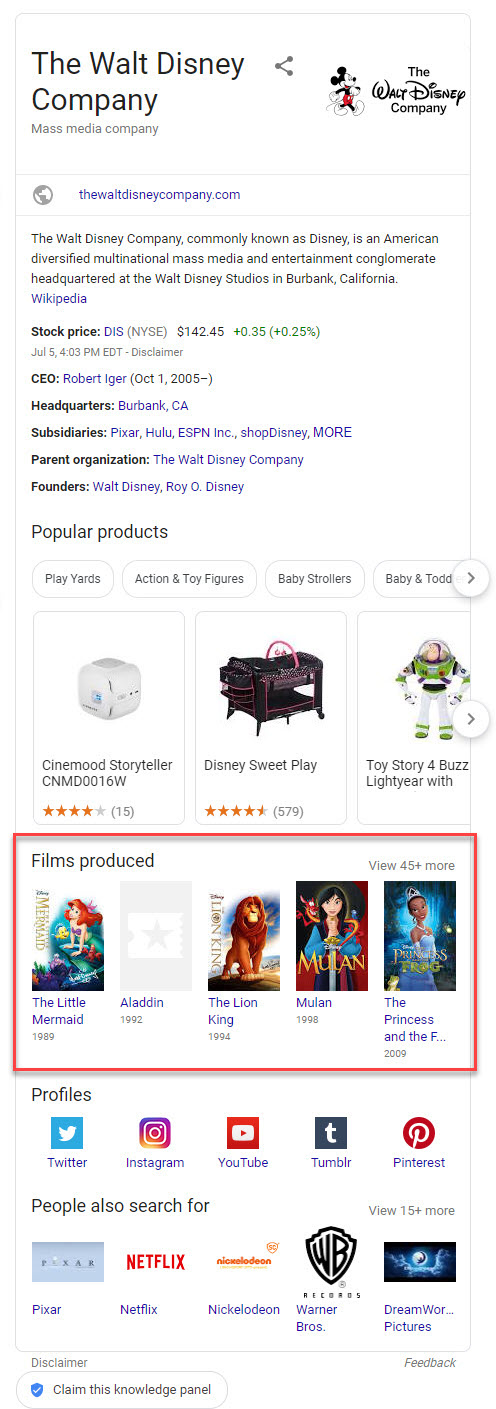
The most recent incarnation includes a section entitled Films produced which digs into the movies Disney’s studio has put out.
This appears to be the beginning of a new trend. Until this point, panels for Google entities like corporations did not include a topical understanding and segmentation of the entity beyond what would be considered “generic.” In fact, as of the writing of this article, most such Google entities still do not have a layered look at who the entity is beyond the traditional elements of the Knowledge Panel.
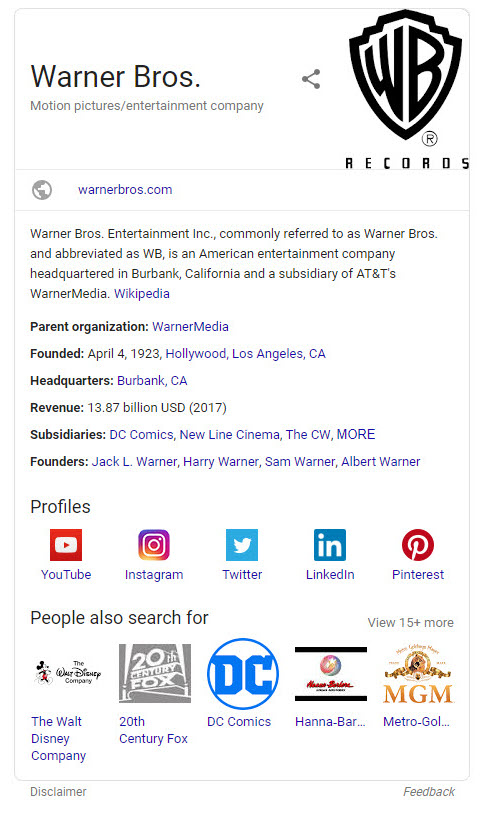
That said, slowly but surely this appears to be changing. Google seems to be applying its Topic Layer not only in new ways but to new entities. For example, Google will now at times include entity segmentation such as a ‘carousel’ of executives within a corporation’s Knowledge Panel:
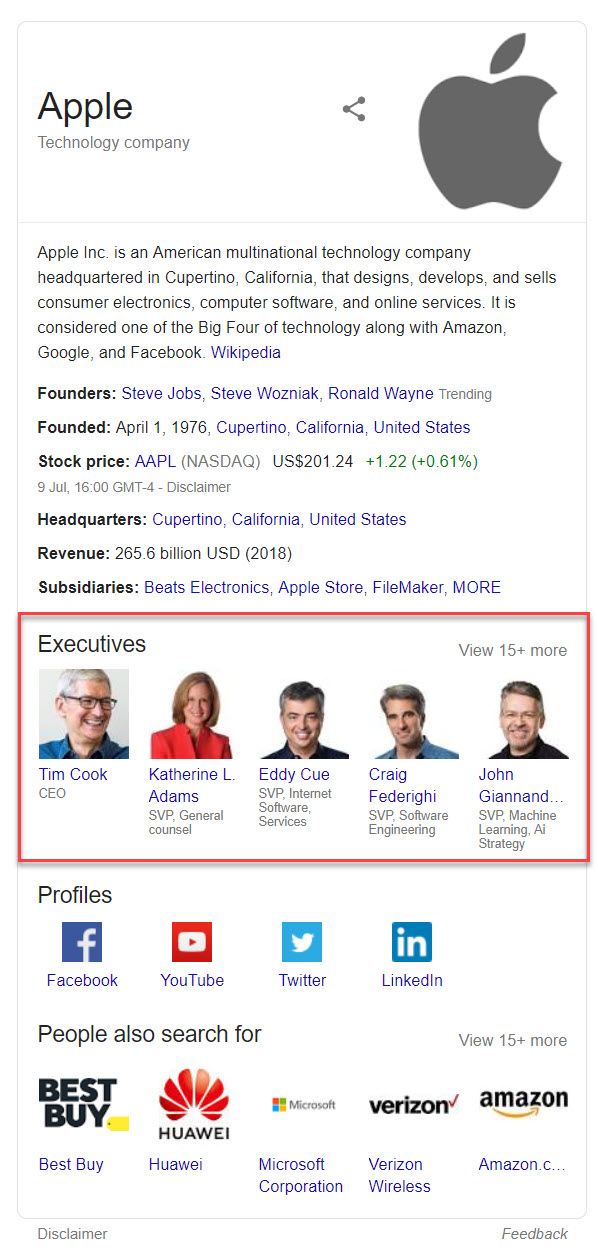
In fact, the display of such entity segmentation on desktop (as opposed to mobile) is in it of itself novel as we’ve traditionally seen the Topic Layer manifest itself solely on mobile.
Google’s Topic Layer is burgeoning – plain and simple.
Beyond the Top Layer: A Look at Google’s Ability to Dig Deeper Than Ever into Google Entities
Google’s use of the Topic Layer has not only become more common but it’s reached a new level. In specific, it very much appears that Google is able to strip away more layers of an entity’s topical equation. That is, Google is now able to go further into the topics that are uniquely relevant to an entity. Think of it like Google being able to not only identify topical layers applicable to an entity but sub-layers as well. I say sub-layers because a large number of cases I have seen all point to Google taking an existing topical layer and further segmenting it.
In other words, Google is now able to determine what is expressly topically relevant to an entity and then sub-categorize that understanding. This results in there being sub-layers of topics within the Knowledge Panel.
Have a look at this Knowledge Panel for the Miami Dolphins, an (American) football team:
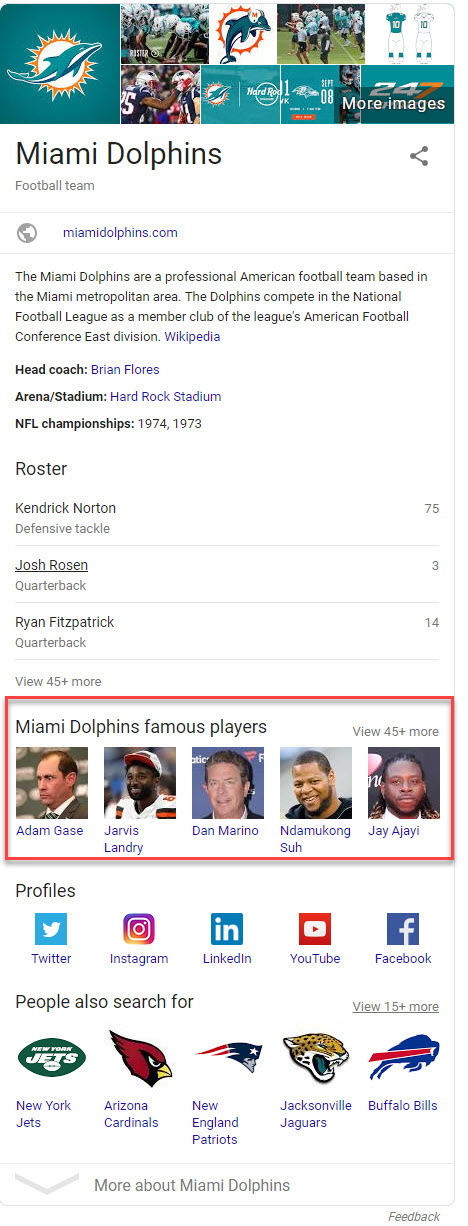
Like with Apple’s Knowledge Panel (shown earlier) we have a ‘carousel’ of people that represents the team’s “famous” players. This is the perfect example of what I mean when I say that Google is further segmenting its current “topical layers.”
How so?
In reality, what happened here is that Google pulled out one of the tabs it shows within the entity’s mobile Knowledge Panel and placed it within the desktop version. If we head over to mobile, we can see the full set of tabs, including a tab for famous players. That said, the mobile version of the Knowledge Panel also shows a tab entitled ‘Players’:
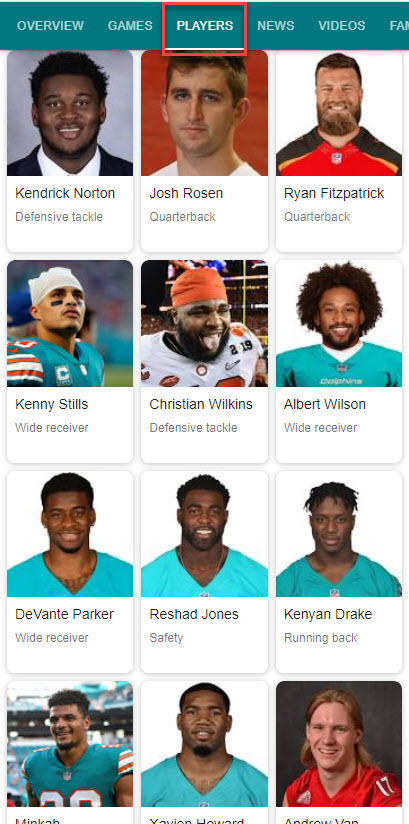
Think of the ‘Players’ tab as the equivalent of a tab entitled ‘Albums’ or ‘Songs’ for a famous musical artist. It’s a very relevant topical tab, but at the same time, it’s very generic in that it is related to an entire category of entity. A tab entitled ‘Players’ is relevant to any sports team. What Google did here was to take a highly relevant topical tab and make it a bit less generic by showing a more specific type of player within an entirely new tab, namely, ‘famous players’.
Think of the ‘Players’ tab as the genus with the famous players being the species. Google sort of said to itself, “Well, we know that the current roster of players is very much relevant to a sports team/entity, but how could we get a bit more specific with that same sort of topical content? Oh, we could create a more refined player segment, in this case, famous players.”
You could argue that even ‘famous players’ is a very generic subset. After all, doesn’t every team have famous players?
You’d be correct in that assertion if Google was not, in fact, getting far more specific with the type of player subset it is now showing for certain teams within their Knowledge Panels.
A great example is my favorite NFL football team, the Pittsburgh Steelers. The team, along with the ‘Players’ tab, has a Knowledge Panel tab entitled American Football Wide Receivers:
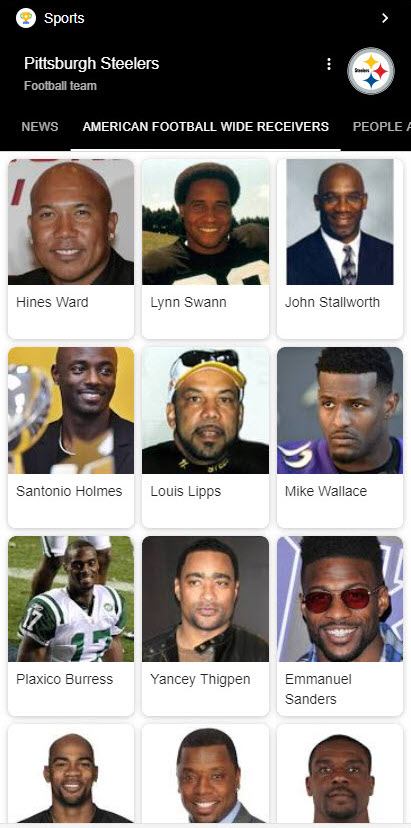
Here, Google has added a tab, not for players per se, but for a specific type of player (i.e., those who played the wide receiver position – they who catch the ball). In other words, Google has taken the idea of showing topically relevant content via the form of ‘players’ by presenting us with a highly specific type of player.
Still, there is more than meets the eye here. There are well over a dozen different positions in what many consider to be the ultimate team game, American football (calm yourselves “soccer” fans). So why then did Google choose the wide receiver position (again, the receiver is they who catch the football) over any other?
Here’s where my watching hours of football is finally paying dividends… because the Pittsburgh Steelers are famous for their wide receivers. I could go into the history of the game and explain that the Steelers were the first team to fully capitalize on the rule changes back in the 1970s that made the game more of a passing game and not a running game (previously, teams primarily moved the ball down the field by running with it)… but you don’t care about these things.
All you need to know is that this specific team is widely known for its 40-year history of having Hall of Fame caliber wide receivers. But just in case you might think I am biased towards my own team (which I am), here is the carousel Google shows for the query best wide receivers of all time:

Three of the players Google showed within the Pittsburgh Steelers Knowledge Panel are present in this carousel. Google, at least partially, chose this subclassification of player because it was aware of its pertinence to the entity.
As such, and similarly, for the NY Giants Google shows a tab for American Football Linebackers (they who knock those who throw the ball on their rear ends with traumatic force).
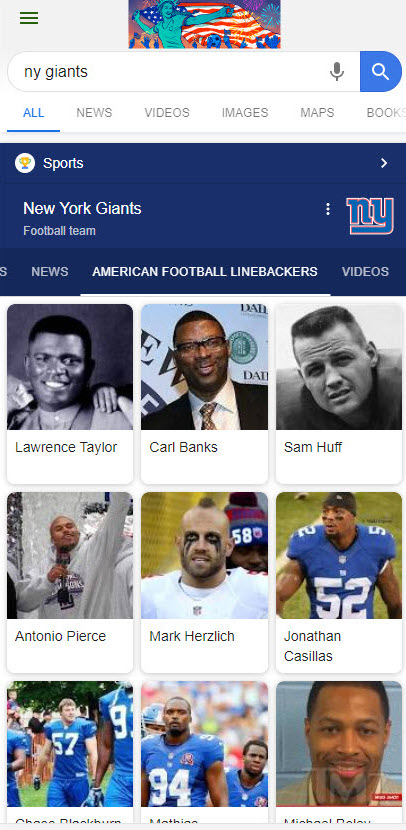
This too makes sense as the best linebacker ever played for the Giants (Lawrence Taylor).
Google also gives the Chicago Bears a tab for their most famous asset… Coaches:
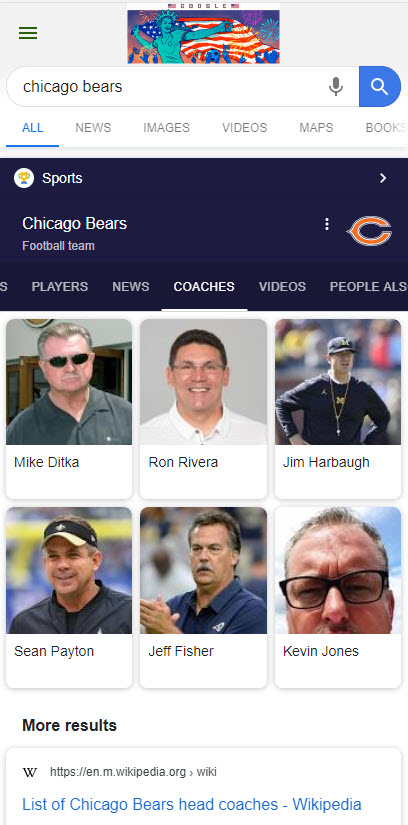
Google, Digging Deeper into More Entities More Often
I had originally planned on doing this case study about two months prior to me actually sitting down and writing what you’re reading right now. During my initial research, I found that only American Football teams appeared with tabs reflecting Google’s ability to subclassify specific topical elements within the Knowledge Panel.
Fast-forward to the present day and all sorts of American sports teams have topical subclassification represented in their Knowledge Panels.
Here’s an American professional hockey team with a tab just for the team’s all-time goalies (they who stop the vulcanized rubber disk flying at them at 100 miles per hour from going into the net):
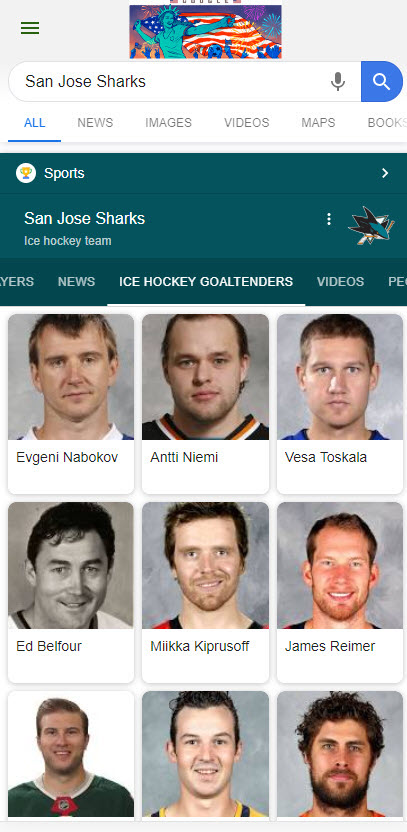
Behold a Knowledge Panel for the Toronto Blue Jays baseball club showing the best pitchers to ever play for the team (most of which either came from or went to my beloved NY Yankees…. I’m just saying):
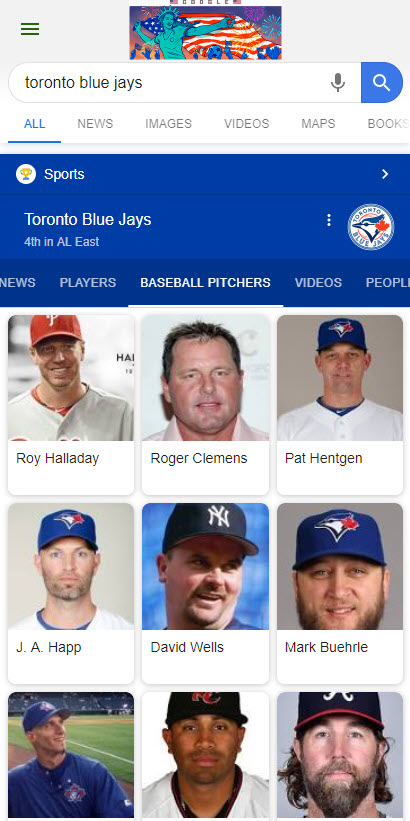
Now here’s a panel for the Milwaukee Brewers highlighting the club’s managers:
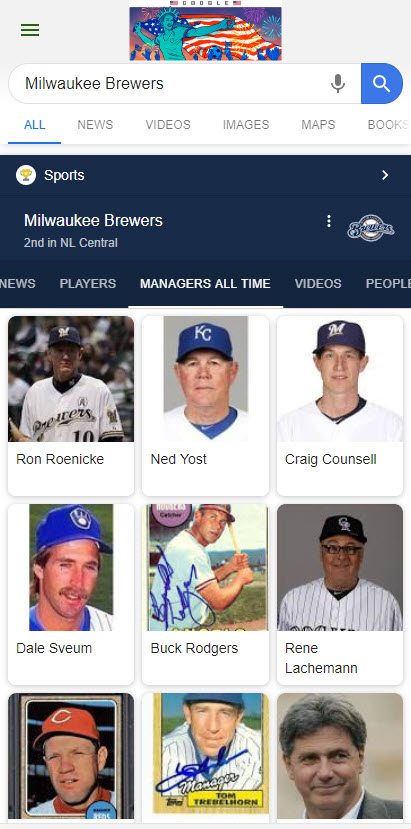
Jumping to basketball, we have the NY Knicks showing off their most famous players:

The point is, none of this was here just two short months earlier!
Google’s Entity Subclassification: Still a Work In Progress
Not all is hunky-dory in Google’s quest for supreme entity understanding. While Google has clearly made a nice step forward, its task of subclassifying entities is still a work in progress. There are some glaring issues, areas for improvement, and some questions that need to be answered…. Like why would you show a Knowledge Panel tab for the New England Patriots that reads American Football Tackles:
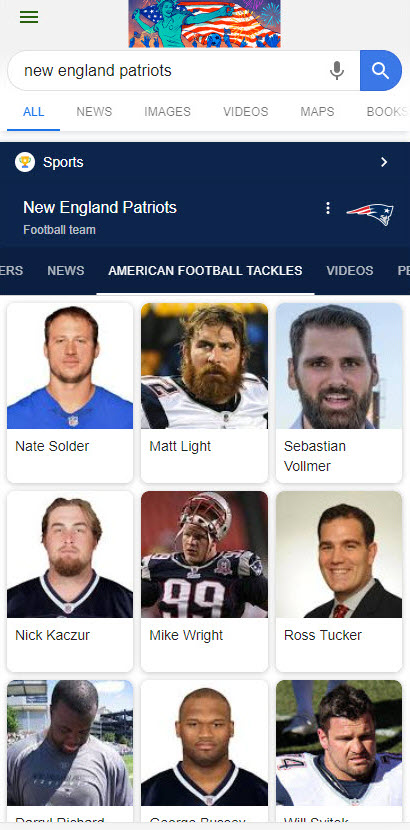
For starters, the New England Patriots are famous for either their coaches or current Quarterback (they who throw the ball), i.e., Tom Brady. Secondly, of all the positions in American Football, the “Tackle” is not one of the “***” positions that fans fawn over. It’s an odd choice. It’s like highlighting a restaurant for its house salad… no one cares.
Aside from some of the subclassification choices per se, it is a bit odd to see what Google has and has not subclassified (at least to this point). The Florida Marlins are one of the worst, most horrible, incompetent organizations in all of Major League Baseball history… yet despite this, and despite only entering the league in 1992, their Knowledge Panel contains a carousel featuring of its most famous players:

Meanwhile, the New York Yankees, the most recognized global brand perhaps in all of sports, the team with the most World Series wins (i.e., championships), and the home of Babe Ruth, Micky Mantle, Joe DiMaggio, and Derek Jeter (i.e., the greatest players to ever play the game of baseball) gets… nothing:

Yes, I’m still the same 10-year-old kid who feels that sense of nostalgia while watching every Yankee game I can, but the Yankees are objectively speaking by far the most famous baseball team. Indeed, Google’s own Featured Snippet lists the Yankees as the third most famous sports team in the world. Yet, no famous players appear in its Knowledge Panel.
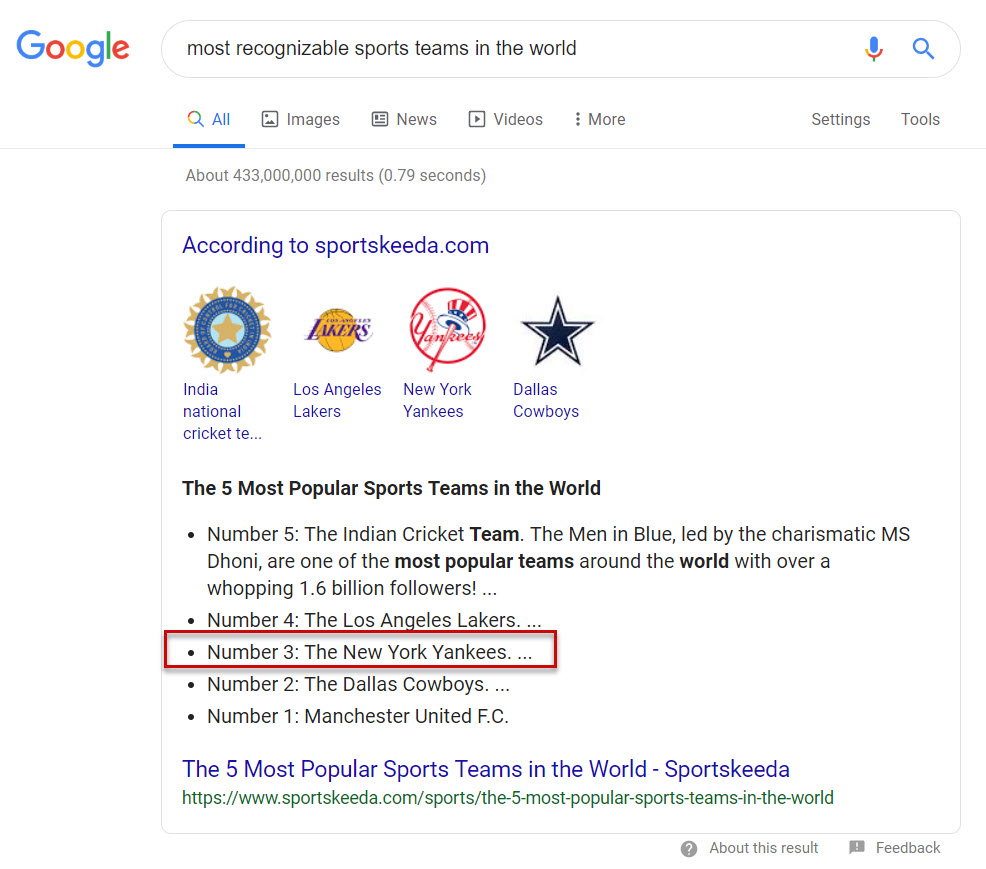
A Featured Snippet lists the NY Yankees as the third most popular sports team in the world
Forget complex topical appraisals (or what you might call splitting hairs), Google has some work still to do in the accuracy of the information included within its Topical Layer tabs. Take this tab on Boston Red Sox Managers, for example:
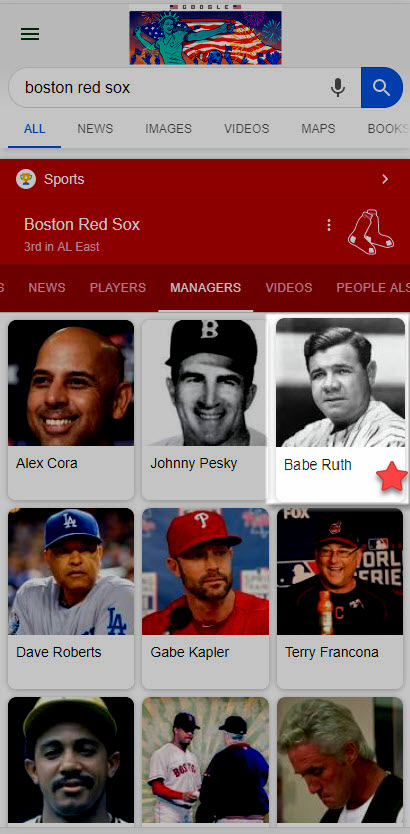
Babe Ruth was never a manager for the Red Sox. What happened here is that Google simply scraped the content from Wikipedia incorrectly. According to Wikipedia, Ruth was being considered for the position but showed no interest in it:
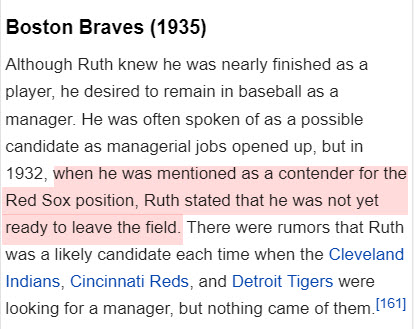
All that being said, it is clear that we are still in the early stages of Google working its topical subclassification magic. It’s a work in progress as Google is still very much experimenting with its topical subclassifications. Take the Knowledge Panel for the Dallas Cowboys. Back in April when I first saw topical subclassification manifesting itself in the Knowledge Panel the tab All Time Receivers was shown:
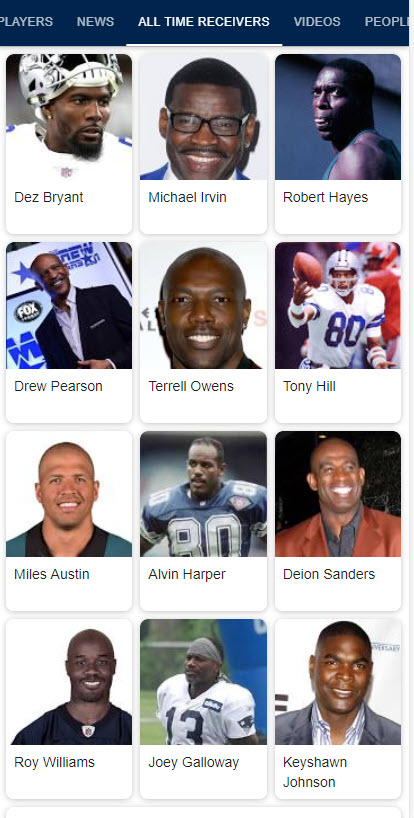
Now, we get a tab for American Football Linebackers:
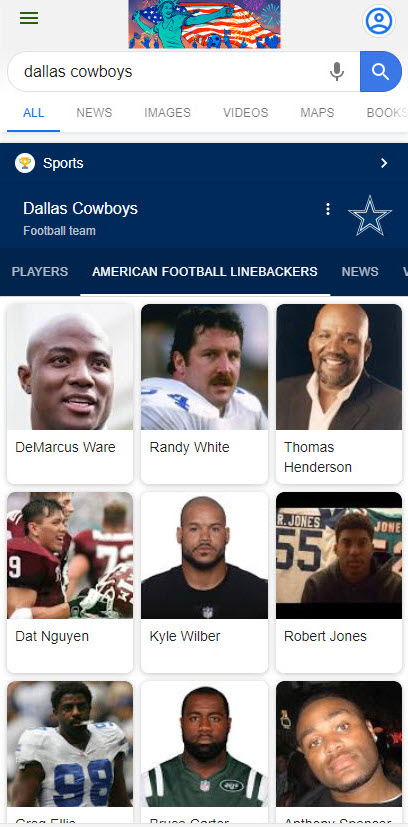
Other than the fact that for this team/entity the initial tab shown (All Time Receivers) is far more relevant (just take my word for it), the topical subclassification rotation points to Google still being in the experimental phase.
More than that, Google has not really taken its subclassification abilities and applied them to other entities beyond sports teams. Nothing tells me that Google is still at the early stages of its topical subclassification abilities more than the fact that these highly specified tabs only appear for sports teams.
By the way, **** or hate sports, teams as entities are the perfect place to start. There is just an abundance of easily accessible information to make use of. No one keeps records of things for all sorts of nonsense more than the world of sports. On top of that, when trying to subclassify an entity, “teams” are an easy target. Sports teams lend themselves to natural subclassification. You have types of players, types of positions, and a host of other ways to dig deeper into the entity.
In other words, when it comes to topical subclassification of entities, sports teams are a great place to start if you’re looking to bring that sort of advancement to all other sorts of entities. As in, I think Google is going to bring all sorts of topical subclassification to all sorts of entities in the relatively near future.
Is a Monstrous Entity Indexing Advancement Looming?

I’ve been waiting for this moment for a long time. Ever since the SEO narrative started talking about Google’s entity-centricity I have been waiting for the one sign that we’re headed into a totally new era of Google results. I think that one defining “entity understanding” ability is here. It’s one thing to be able to qualitatively understand an entity, to know what is topically relevant in a specific manner… it’s another thing entirely to dig into that entity and strip away layer upon layer of its identity.
Being able to subclassify the various elements that make up an entity’s identity is a catalyst that could really open the floodgates. A capacity to parse an entity on the micro level combined with how we’ve seen Google relate to the SERP almost intrinsically means a flood of new SERP feature elements if not new SERP features per se. But, remember, Google profiles sites as well. Thus, with Google’s nuanced ability to subclassify entities could come a substantially more refined understanding of a site as an entity.
What I’m trying to say is, we’re on the cusp of an entity understanding explosion that is set to change the entire qualitative picture of what search is and what search results show users!

.png)


